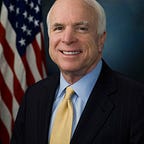Populism in the Service of Internationalism
The Brussels Forum has become a critical thread that helps to bind the fabric of our transatlantic community, and I am honored to join you. Let me also thank the Belgian government and people for being such gracious hosts. I know that most of us have paused this week to reflect and say a prayer for the innocent Belgians and other citizens from five continents who were murdered, and the hundreds more who were wounded, when ISIS attacked this city one year ago this week. But what has been clear to me in just the one day that I have been here in Brussels is that ISIS failed in its mission of terror. Belgium today stands stronger and more united to resist this threat to our common civilization. So does Europe. So does America. And we do so together, as one transatlantic alliance.
I was asked to say a few words as part of the effort at this year’s conference to mark the 70th anniversary of the Marshall Plan, which inspired a grateful Germany 45 years ago to give America the gift of the German Marshall Fund.
We all remember that the Marshall Plan saved the West. It helped a new world order emerge from the ashes and chaos of world war. What is less remembered is how much persistent, painstaking political salesmanship went into the establishment of the Marshall Plan and the world order it helped to secure.
Our predecessors had faith in the rightness and justice of our ideals. But they did not rest upon that faith alone. They took nothing for granted. They knew their capacity for an ambitious foreign policy would only be as strong as the domestic political consensus on which it rested. And they set out to build both together.
“History is lived forwards,” an English historian once wrote, “but it is written in retrospect. We know the end before we consider the beginning.” And in the beginning, our predecessors faced setback after setback: the Berlin Blockade, the communist coup in Czechoslovakia, the near collapse of Greece and Turkey, the Soviet atomic bomb, the communist victory in China, the invasion of South Korea — not to mention the difficulties they faced at home.
In the United States, it is easy to forget that early drafts of the North Atlantic Treaty, which created NATO, were flatly rejected by Congress. It is also easy to forget that the political battle over the Military Assistance Program, the first U.S. military foreign aid program of the Cold War, was so fraught that it was likened at the time to the Battle of Gettysburg.
And as we celebrate the 70th anniversary of the Marshall Plan, we must remember that it, too, was never a foregone conclusion. Many Americans did not initially believe that giving their hard-earned tax dollars to Europeans in need was in their self-interest. They needed to be convinced of it.
America’s Secretary of State, Dean Acheson, literally crisscrossed the country for months on long drives and train rides to take the case for global engagement directly to the American people.
Yes, he gave speeches in Washington, but also in Spokane, Washington.
He didn’t just speak to the World Affairs Council in San Francisco. He spoke to the National-American Wholesale Grocers Association in Atlantic City, New Jersey.
After speaking with busloads of miners in Duluth, Minnesota, Acheson stayed up into the wee hours of the morning selling the Marshall Plan to crowds rotating in and out of a hotel ballroom. A quarter got them a coffee and a chance to hear why the greater good, the resurrection of Europe and the West, was in their interest.
My friends: This was populism in the service of internationalism. And that is why we succeeded. And we have never needed that kind of effort more than right now. Our fellow citizens on both sides of the Atlantic are asking many of the same questions that our predecessors confronted seven decades ago. Why do we need an alliance? Why should we spend money on defense programs and foreign assistance when our citizens are struggling here at home? Why should we risk our blood and treasure to defend or benefit people half a world away? What’s in it for me?
These questions are so old and fundamental that we seem to have forgotten the answers. And that is why our people are turning away from us. We just need to be honest about that. But we must also acknowledge that we can do better, and we must. We can and must explain, as our predecessors did, why there is still such thing as the greater good, why our vision of world order is indispensable to our common security and prosperity, and why all of this expenditure of money, and effort, and time benefits us — our people, our interests, our values, our alliance.
The success of the West … of a new, different, better kind of world order…of the transatlantic alliance dedicated to a Europe whole, free, and at peace … none of this was preordained. It was earned. Free citizens persuaded one another that our values, and the security and prosperity they generate, were worth the fighting for. We marshalled our power and influence in their defense. We bore the costs and the sacrifices. We made the choice to defend our common interests and shared ideals.
We did all of this before, and we can do it again. This is no time to despair — for on our side we have the cause of truth, and right, and justice. This is a time to trust each other, rely on each other, roll up our sleeves together, and work even harder on behalf of the values, and the world order, and the way of life that we all hold dear. I thank all of you for joining me in this effort, and for being here today.
